Are you looking for the best way to learn guitar? Well, you’re in luck! Learning how to play guitar doesn’t have to be an overwhelming process — with practice and patience, anyone can do it. It’s important to understand the workflow involved in learning guitar so that you can create your own unique approach tailored towards your desired skill level. Whether you want to ace solos or study classical pieces, there are various steps you need to take upfront before diving into a specific style of playing. In this blog post, we’ll outline all the necessary information on learning how to develop as a guitarist and make meaningful progress along your musical journey through tried-and-tested strategies – because everyone has their own individual style when it comes to picking up any instrument!
Is Guitar Easy to Learn?
The answer to this question depends on a variety of factors, such as your musical background, the type of guitar you’re learning and how often you practice. Generally speaking though, learning guitar can be easier than other instruments due to its relatively simple chord progression and structure. With regular practice and dedication, anyone can learn the basics of guitar in a short amount of time. Additionally, playing guitar is fun, so it won’t feel like a chore.
Overall, guitar is a relatively easy instrument to learn compared to others. With dedication and perseverance, anyone can become proficient in playing the guitar in a reasonable amount of time. Whether it’s strumming simple chords for personal enjoyment or honing complex techniques for more advanced pieces – with the right guidance and determination anyone can enjoy playing the guitar!

What Is The Best Way To Learn Guitar?
The best way to learn guitar is to start by developing a strong foundation of knowledge. This includes understanding the basic principles of how the instrument works, learning proper technique and posture, and having a clear idea of where you want to take your playing. Just as important is making sure that you have access to quality instruction, whether it be in-person lessons or online tutorials.
It’s also important to set realistic goals for yourself. If you expect too much too soon then you could get discouraged, so make sure that each step builds on the last one in an achievable manner. This helps ensure steady progress and keeps motivation levels high.
One great way to start learning guitar is with chords. Start out with the most common chords and then slowly add more to your repertoire. This allows you to start playing songs quickly, even if it’s just simple strumming patterns with basic chords. From here you can learn new techniques such as fingerpicking or hammer-ons, and move on to more complex chord progressions.
Another effective way to learn guitar is through ear training. This involves learning how to recognize intervals, chords, scales, and other musical concepts by listening rather than reading notes from a sheet of music. Ear training helps develop a better understanding of what you hear from your instrument and will make it easier for you to play by ear over time.
Finally, don’t forget the importance of practice! Regular practice is essential in order for any skill to be developed and the same is true for guitar. Make sure you set aside time each day to practice and get better, even if it’s just for a few minutes at a time. Consistency is key!
By following these steps, you can create an effective plan for learning guitar that will help ensure steady progress and make the process far easier. So don’t be afraid to take on the challenge of mastering this instrument – with some dedication and hard work you’ll be playing like a pro in no time! [1]
1) Practice in the Ideal Learning Environment
When you practice learning the guitar, it’s important to make sure that you’re in a comfortable and suitable environment for learning. This means that you should have adequate lighting, good acoustics and no distractions or other noise from outside sources. Make sure to also have all of your equipment nearby and ready so that you can grab it as soon as needed without having to search around your area. Additionally, it would be helpful to have a mentor or tutor present who can help guide your progress and answer any questions you may have about techniques or playing styles.
2) Workout and Train Regularly
If you want to master guitar playing, then it’s important to make practice a regular part of your life. Like any skill, the more you practice the better you become. Make sure that you dedicate some time every day to working on your guitar skills. You should find ways to challenge yourself and discover new techniques along the way so that you can keep track of how much progress you are making. Additionally, try varying up your practice routine by tackling different styles or learning different songs as this will help ensure that your exercises remain engaging and stimulating. If at all possible, have someone else train with you – having a sparring partner can be hugely beneficial in helping motivate each other and pushing ourselves further. This can also serve as an opportunity to learn from each other and share ideas. [2]
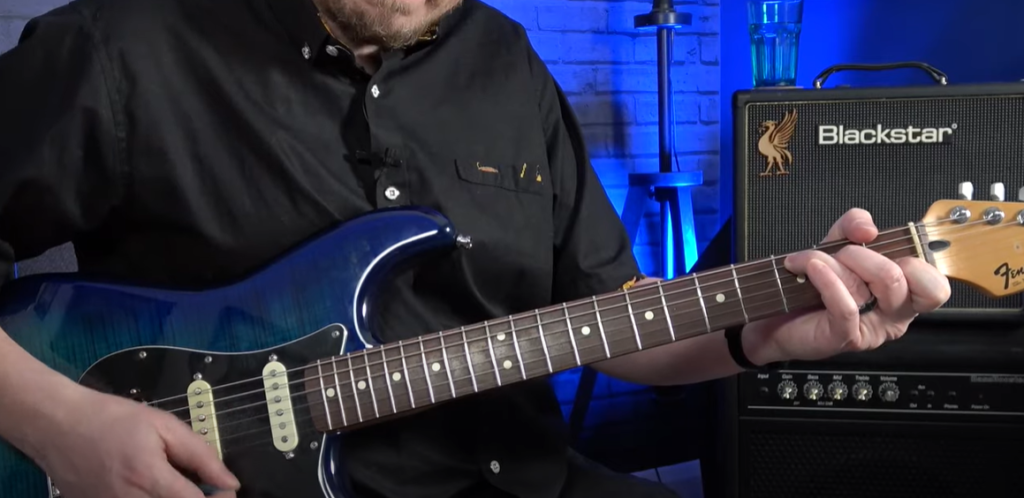
3) Know Your Chronotype and Practice Accordingly
Knowing your chronotype is essential to making sure you practice guitar efficiently. Chronotypes are the natural rhythms of our bodies that determine when we are most and least alert throughout the day. There are four main chronotypes: morning larks, night owls, hummingbirds (who are neither a morning lark or a night owl), and third birds (who change their sleep schedules regularly). Knowing which one you are will help you customize your practice schedule in order to maximize efficiency. For example, if you’re a morning lark, it’s best to plan your practice time for earlier in the day because that’s when you’re most alert and energetic.
On the other hand, if you’re a night owl, planning your practice time for later in the day can help you stay focused and productive. In addition, knowing your chronotype can help you figure out when to take breaks from practicing so that you don’t burn out. Whether it’s 10-minute coffee breaks or full days off, it’s important to give yourself a chance to recharge and refresh your mind before returning to practice. Ultimately, understanding your body’s natural rhythms is an important part of making sure that you practice guitar effectively.
4) Meditate and Visualize
Meditation has been proven to be an effective way to reduce stress, improve focus, and increase overall productivity. This is especially true when it comes to learning how to play guitar. Taking a few moments every day to clear your mind and reset can help you stay focused during practice sessions. In addition, visualizing yourself playing guitar can help you progress at a faster rate. As you meditate, picture yourself mastering certain techniques or playing certain songs with ease. The more clearly you can visualize yourself succeeding at something the more likely it is that you will actually achieve it in real life. Combining meditation and visualization with regular practice sessions can help ensure that you make the most out of your time spent learning guitar.
5) Chew Gum
While this may sound silly, studies have shown that chewing gum can help to improve focus and concentration. This means that when you are learning the basics of guitar playing, like the correct hand positions or reading tablature, you may find it easier to stay on task by simply popping in a piece of gum. By maintaining your focus and avoiding distraction from outside sources, you will be able to learn how to play guitar effectively and efficiently! So next time you sit down to practice your chords and licks, try chewing some sugar-free gum for an added boost.
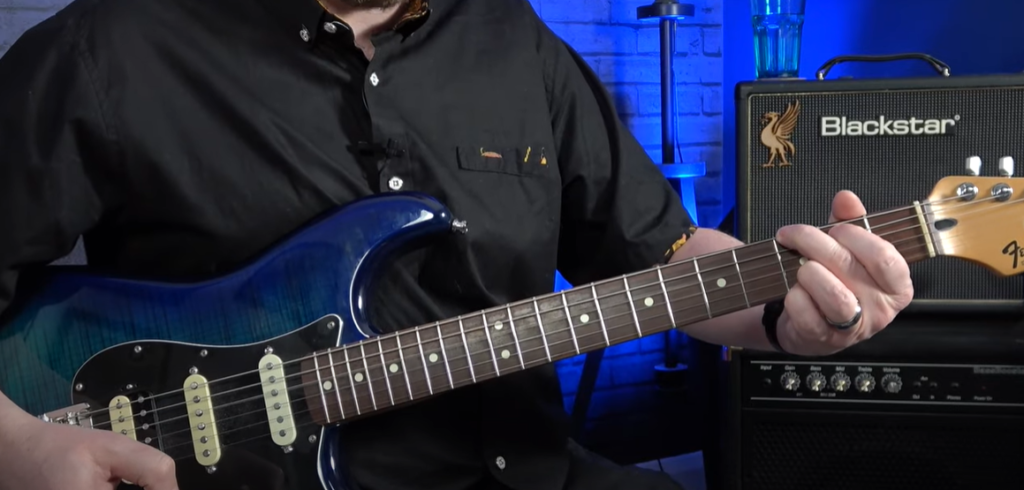
6) Sleep and Rest
Playing guitar is a physical activity and your body needs to recover in order for you to be able to play at optimum levels. Make sure to get enough sleep every night so that you can perform your best while learning guitar. Additionally, take regular breaks between practice sessions so that you are not overworking yourself. Taking some time off will help you stay motivated and maintain the enthusiasm for playing guitar.
7) Keep On Achieving Goals
Setting small and attainable goals can help you stay motivated while learning guitar. It’s easy to become discouraged when facing the immense amount of information available, so setting smaller goals that are achievable within a certain time frame can help keep you on track. Additionally, it’s important to recognize success and reward yourself when you accomplish a goal. This will provide encouragement and inspiration to continue improving through practice and dedication. [3]
8) Enjoy the Dopamine High
It’s been proven that playing an instrument releases dopamine in the brain, and guitar is no exception. This pleasure hormone makes us feel good, so make sure you take a few moments during practice to enjoy the feeling of accomplishment you get from learning a new song or mastering a difficult chord.
9) Listen to Music While Taking a Nap
Listening to music while taking a nap is a great way to learn guitar faster. It helps you relax and allow your subconscious mind to absorb the music in a deeper way. You can listen to your favorite songs or instrumental versions of them, as this type of exposure to melodies and chords makes it easier for you to understand and remember them when playing them on your guitar. Plus, the extra sleep will help keep you energized so that you are able to make the most out of each practice session!
10) Get Tested
It is important to get tested periodically to assess your guitar playing skills and understand where you need to improve. Taking tests helps you identify which aspects of guitar playing you have mastered and which ones still need a bit of work. Tests can help keep you motivated and track your progress over time, so make sure to take them as often as possible!
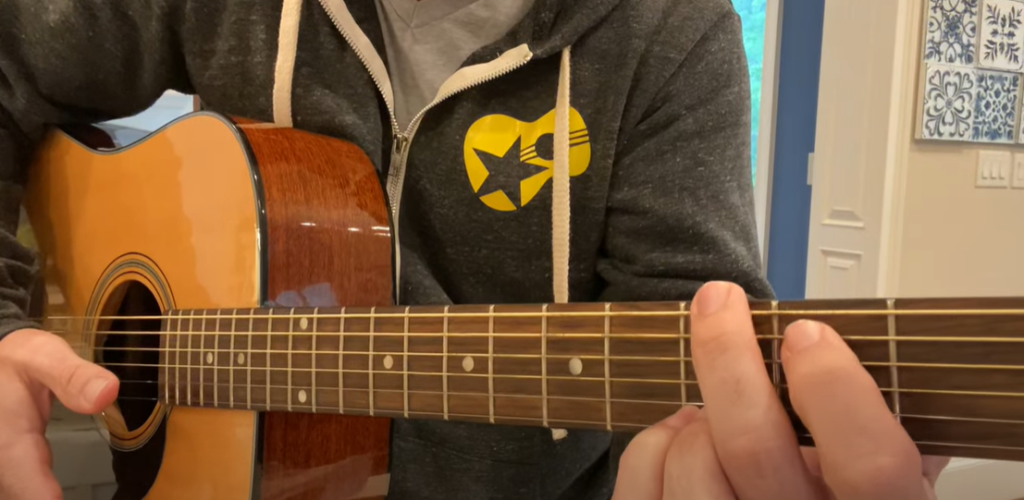
11) Use Multiple Sources of Media
When trying to learn something new, it’s important to take advantage of all the resources available. Books, videos, and tutorials are great for learning chords and progressions, but don’t forget about other types of media such as podcasts and online courses. These can provide you with additional insights into guitar playing that can really help speed up your learning process!
12) Use Mnemonics Where Possible
Mnemonics are powerful tools that help you remember things more easily. To use this technique for learning guitar, create a sentence or phrase from the chords and notes of the song you’re trying to learn. This will make it easier for you to recall the different components of your solos and progressions when playing them on your guitar.
13) Read, Read, and Read Some More
The best way to learn guitar is to read up on the instrument and its history. Learning about the different styles of playing, the various techniques used, and gaining a better understanding of musical theory can all make you a more well-rounded musician. Plus, reading will give you an appreciation for how much effort goes into perfecting your craft.
14) Design Your Own Guitar Lesson Plan
Designing a lesson plan tailored to your specific guitar learning needs is one of the best ways to learn guitar. Establish goals, create a curriculum, and include activities that will help you reach those goals. Consider adding in songs you enjoy playing or techniques that are particularly challenging. Create short-term and long-term goals so that you can measure your progress along the way. With an organized, comprehensive lesson plan for yourself, it will be easier for you to stay motivated and dedicated on your journey to learning how to play guitar.
15) Play for Others
When you start getting comfortable with playing guitar, don’t be afraid to share your skills. Playing for others is an excellent way to further challenge yourself and hone in on your craft. You can find friends or family members that are willing to listen, or look into local gigs in the area. Nothing motivates like performing for a crowd—you’ll quickly discover that it’s one of the best ways to learn guitar! [4]
16) Speak to Other Guitarists
Speaking to other guitarists is a great way to get tips, advice and learn from their experiences. Tap into the collective knowledge of fellow musicians in your area or online. Not only is this a great way to find out new music and techniques, but it can also be inspiring—you’ll come away with a refreshed perspective about what’s possible for you on guitar.
17) Pick Up Songs By Ear
Learning to pick up songs by ear is an invaluable skill as it allows you to learn music without sheet music. It can be daunting at first but with practice and patience, you can master this technique. To improve your ability to pick up songs by ear, try listening to the track multiple times and trying to replay each note on your guitar. This will help you understand the melody of a song better and make it easier for you to recreate it on your own. Additionally, working through exercises that focus on playing melodies from memory can also help hone this important skill. With enough practice, picking up songs by ear will seem like second-nature!
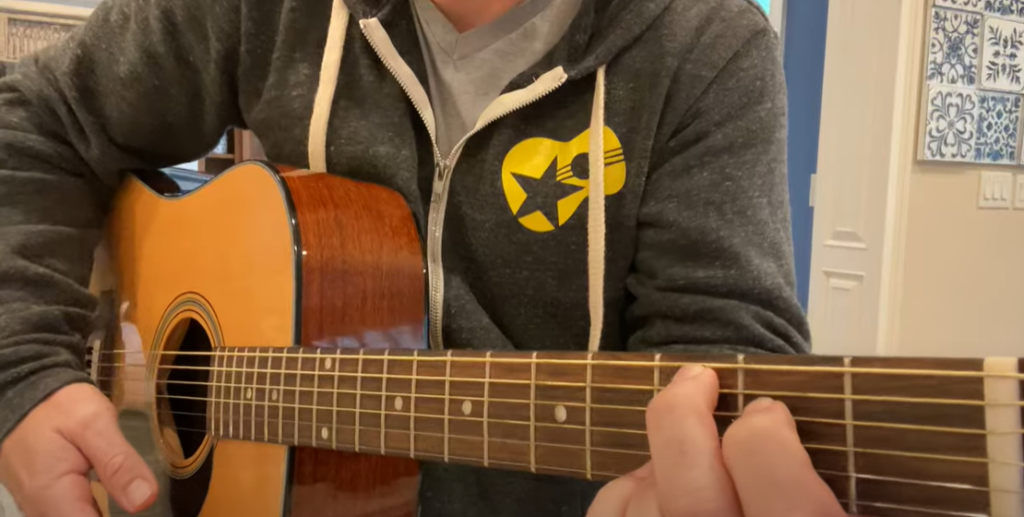
18) Take Online Guitar Lessons
Taking online guitar lessons is a great way to enhance your guitar playing. By having an instructor guide you through topics such as chords, scales, and theory, you can learn in a structured way that helps to build your knowledge base. Additionally, some online courses are tailored specifically to your musical interests or skill level so you can get the most out of each lesson. Online lessons also provide access to resources like additional exercises or video tutorials that can help further your learning.
19) Hire a Guitar Teacher
If the self-teaching route isn’t for you, consider hiring a guitar teacher. Having a professional guide you through your musical journey can be extremely beneficial as they have an in-depth understanding of music theory and technique that helps to quickly improve your playing. Also, since teachers are experienced players themselves, they are able to provide personalized instruction based on what works best for you as a student. Additionally, having someone else to learn with can help keep you motivated and accountable throughout the process. For those serious about learning guitar, hiring a teacher should definitely be considered!
20) Experiment With Different Playing Styles
Experimenting with different playing styles is one of the most enjoyable aspects of learning guitar. From blues to classical and even heavy metal, there is always something new to explore. Even if you have a preferred style already, try challenging yourself by attempting songs from other genres and exploring different techniques. Not only can this help to improve your playing but it also makes learning guitar more interesting as you are essentially creating your own sound. Experimenting with new styles is an essential part of improving as a musician.
These are just some of the best ways to learn guitar. With dedication and practice, you’ll be able to master any skill that comes your way!
Can You Teach Yourself Guitar At Home?
Yes, you can teach yourself guitar at home. Learning to play the guitar can be a fun and rewarding experience that you can do on your own or with the help of others. There are many resources available online and in books that provide comprehensive lessons and instruction for beginners looking to learn how to play the guitar. Additionally, there are many helpful tutorials on YouTube which cover all sorts of topics related to playing the guitar, from basic strumming patterns to more advanced techniques like fingerpicking or soloing. With some practice and dedication, anyone can learn how to play the guitar at home!
That being said, having an experienced teacher or mentor available is always beneficial. A good instructor will be able to identify any areas where you may have difficulty and help you work through them. Additionally, an instructor can provide valuable feedback on your playing and help motivate you to keep progressing. If possible, it is highly recommended that aspiring guitarists find a qualified teacher or mentor to provide guidance during their learning journey.
Whichever route of instruction you take, learning guitar at home can be a great way to get started or develop your skills further. No matter what your level of experience is, there are resources available that can help you reach your goals and discover the joys of playing the instrument for yourself! [5]
What Are Stepping-Stone Chords?
Stepping-stone chords are an effective tool used by guitarists to help simplify the process of learning new songs and progressions. As the name implies, these chords act as a bridge between two different chord shapes or positions on the fretboard. By playing stepping-stone chords between a given starting point and target chord, musicians can bypass difficult transitions that would otherwise require a great deal of time and effort to perfect. Stepping-stone chords make it easier to move from one progression to another in a smooth, logical fashion, allowing for more efficient practice and mastering of complex pieces.
These types of chords also have another advantage: They allow for greater creativity when writing music. By adding additional voicing or extra notes into stepping-stone chords, guitarists can take a simple progression and add their own personal touch. This makes it easy to experiment with different sounds and chord progressions in order to craft unique songs that sound great.
If you’re looking for an effective way to learn new songs and progressions on the guitar, stepping-stone chords are definitely worth exploring. With just a bit of practice, you’ll soon be able to navigate the fretboard with ease! [6]
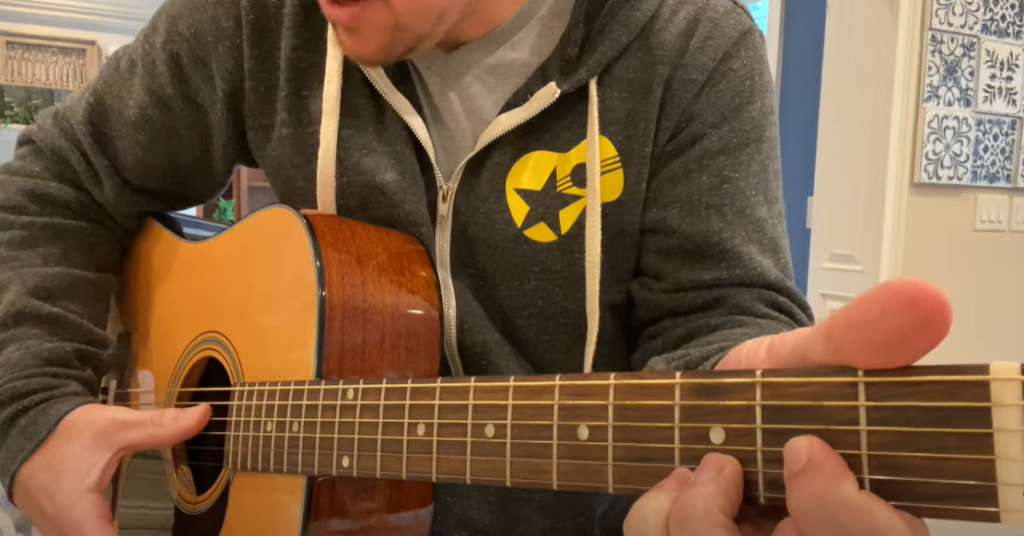
Isn’t It Better To ‘Learn The Hard Way’?
Many people who want to learn guitar think that the only way you can really become successful is if you just do it all yourself and learn the hard way. This makes sense in some ways, as you are teaching yourself, and there’s no one else to take credit for your success, but it isn’t necessarily the best way to go about learning guitar.
By taking lessons from a teacher or joining an online class, you will be able to gain access to knowledge and tips from experienced professionals who can help guide you towards becoming the guitarist that you want to be. It may sound clichéd, but with practice comes progress; by having regular guidance from an expert teacher or class instructor, this progress can come much quicker and more effectively than if you were to just learn on your own.
Moreover, having a teacher or instructor present can give you an extra push of motivation when it comes to practice. Knowing that someone is expecting something from you and giving feedback on your progress can help prevent procrastination, which can be the downfall of many beginning guitarists who are trying to go it alone.
Finally, learning with other people provides accountability, meaning that if one person starts slipping in their commitment to practice, then others within the group may pick up the slack and motivate each other along the way. Together, everyone will benefit from this mutual support system and be able to achieve better results than if they were studying by themselves.
Is One Hour a Day Enough to Learn Guitar?
Yes, one hour a day is enough time to learn guitar. With consistent practice and dedication, you can make steady progress in your guitar playing skills in just an hour of focused practice per day. That said, it’s important to keep your goals realistic and understand that learning the guitar takes patience and hard work.
Make sure to mix up the practice plan from day to day so that you have variety and don’t get bored. This will also help you stay motivated.
If one hour a day isn’t enough for you, consider breaking it up into two 30-minute sessions or scheduling more time if possible. The important thing is to find a practice system that works best for your schedule and stick with it! With consistent dedication, you can become an accomplished guitar player in no time! [7]
Is Guitar Good for Your Brain?
Guitar playing is a great activity to keep your mind sharp and improve cognitive skills. It has been proven that learning to play guitar can develop better motor coordination, improved problem-solving ability, and even enhanced creativity. The left hand must be coordinated with the right hand, while also keeping track of which chords and notes should be played at what time. This mental exercise can help to build up neural pathways in the brain, improving memory retention and information processing skills.
Studies have found that playing music stimulates the growth of new neurons. This means that not only will you become more adept at playing guitar over time, but you may notice an increase in mental acuity as well! Guitarists have been found to have greater memory recall and improved processing speeds when compared to non-musicians. So, don’t be surprised if you start thinking more clearly after regular practice!
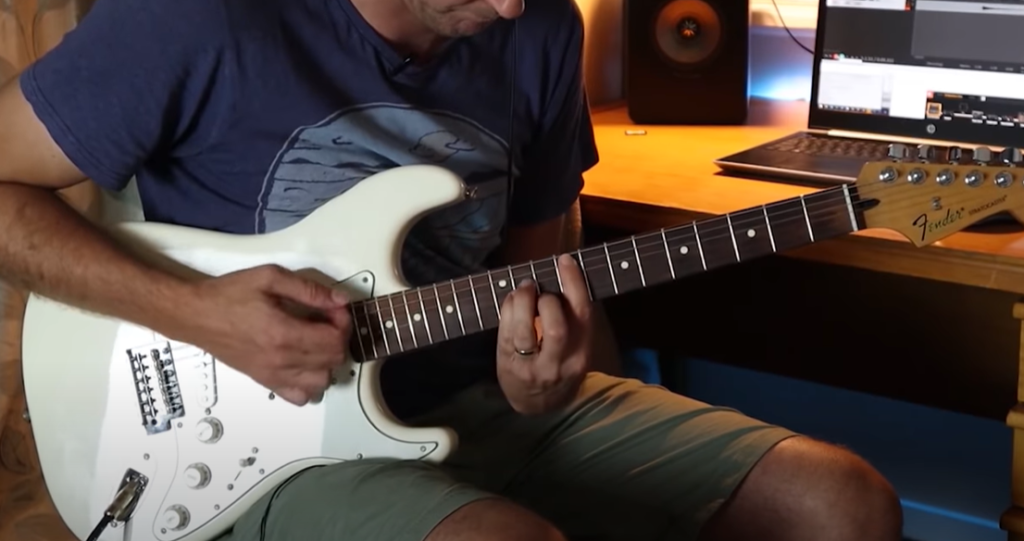
Guitar playing is also known to reduce stress and increase feelings of calmness. Listening to music has been shown to lower blood pressure, relieve tension headaches, and even boost the immune system. It can also be a great outlet for any negative emotions you may be feeling – strumming away on your guitar is a great way to let go of the day’s worries and relax your mind!
So, not only does learning how to play the guitar teach you valuable skills, but it can also help keep both your body and brain healthy.
What Are the Disadvantages of Playing Guitar?
As with any hobby, there are a few potential drawbacks to consider before committing to learning how to play guitar.
Firstly, playing guitar can be quite time consuming and requires considerable dedication. This is especially true when first starting out, as it takes some time to build up strength and dexterity in the fingers.
Additionally, purchasing a guitar may require an upfront investment of money that not everyone may have access to.
Finally, for those who live in smaller spaces or apartments, the sound of a guitar playing may disrupt other people living nearby if played late at night or too loudly.
Despite these minor challenges, however, the rewards from mastering this instrument far outweigh any potential drawbacks! [8]
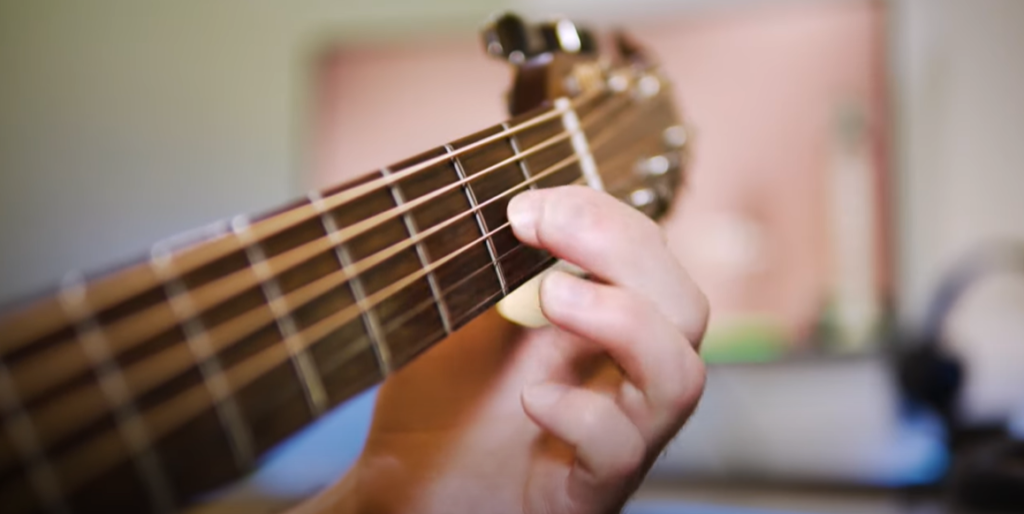
What Should You Not Do on a Guitar?
Just as there are certain things you should do to learn guitar, there are also certain things you should avoid.
- Don’t rush: Take your time learning the instrument and don’t expect to be a guitar pro overnight. Trying to play complex songs too soon can lead to bad habits and frustration.
- Don’t limit yourself: While it’s important to practice techniques and theory, don’t get stuck in a rut of playing the same style or genre over and over again; experiment with different tunes and styles for greater musical understanding.
- Don’t ignore basic technique: We all want to play that killer solo, but make sure you have your basics down first – proper posture, fretting, and strumming are essential for comfortable playing.
- Don’t practice too much: If you’ve been practicing for hours on end without taking a break, your progress will likely be affected. Make sure to give yourself breaks throughout the day to ensure maximum progress.
- Don’t forget about ear training: Playing by ear is an important skill that should not be neglected; make sure to set aside time each day to focus on listening and responding musically to different pieces of music.
- Don’t skip warm-ups: Before diving into practice or performance, take the time to do some basic stretches and get your fingers moving with scales or simple chord progressions. This will help you avoid injuries and make sure your hands are ready for whatever comes their way.
- Don’t be afraid to ask for help: If you’re stuck on a particular concept or technique, don’t be afraid to reach out to an instructor or experienced guitarist for advice; having someone knowledgeable by your side can make all the difference in the learning process.
By following these tips and avoiding common pitfalls, you’ll be able to learn guitar more effectively and become a better musician!
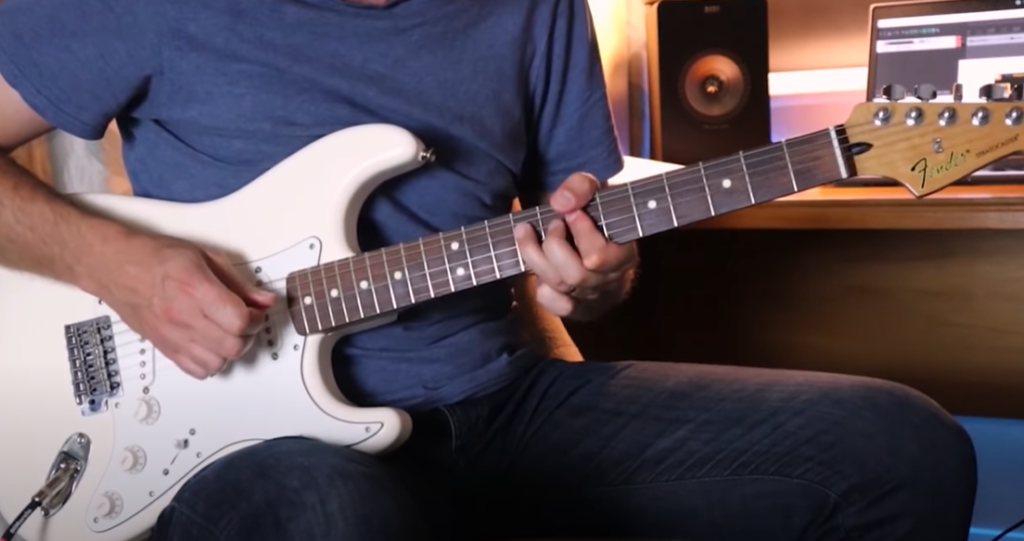
Discovering the Best Way to Learn Guitar: Styles, Resources, and Practice Tips
Uncover the ideal approach to learning the guitar by exploring various learning styles, essential resources, and valuable practice tips. This comprehensive table guides you in your journey to master this musical instrument.
| Learning Styles | Resources | Practice Tips |
|---|---|---|
| Self-Taught | Online tutorials, books, chord charts | Set a structured practice schedule, focus on fundamentals |
| Private Lessons | Professional guitar teacher, personalized guidance | Consistent practice, follow instructor’s recommendations |
| Group Classes | Structured curriculum, peer learning | Collaborate with classmates, attend every session |
| Online Learning | Video lessons, interactive apps | Set goals, use interactive tools for practice |
Explanation of the Table:
- Learning Styles: Describes different approaches to learning the guitar.
- Resources: Lists valuable resources and tools available for each learning style.
- Practice Tips: Provides essential tips for effective practice associated with each learning style.
Understanding these learning styles, resources, and practice tips will help you choose the best way to learn guitar based on your preferences:
Self-Taught: Self-taught learners can utilize online tutorials, books, and chord charts. Structured practice schedules and focusing on fundamentals are key to success.
Private Lessons: Private lessons offer personalized guidance from a professional teacher. Consistent practice and following the instructor’s recommendations are essential for progress.
Group Classes: Group classes provide a structured curriculum and peer learning. Collaborating with classmates and attending every session enhances your learning experience.
Online Learning: Online learning offers video lessons and interactive apps. Setting goals and using interactive tools for practice can be highly effective.
With this detailed information, you can choose the learning style that suits you best and make the most of available resources and practice techniques to master the guitar.
FAQ
What’s the fastest way to learn guitar?
The fastest way to learn guitar is to practice consistently and use the right resources. Taking lessons from a qualified instructor is one of the best ways to ensure that you are getting the foundational skills you need in order to make progress quickly. Additionally, it’s important to find materials (books, websites, apps) that are tailored specifically for your level of skill. This will help you stay motivated and focused as you learn how to play.
What should beginners focus on when learning guitar?
When starting out with guitar, it’s important for beginners to focus on mastering basic chords and strumming patterns. Once these basics have been learned, then it’s time to move onto more advanced topics such as scales and music theory. It can also be helpful to learn a few popular songs, as this will help you become familiar with chord progressions and playing melodies.
Are there any tips to make learning guitar easier?
Yes! One of the most important things is to practice regularly and stay focused on what you are trying to achieve. It’s also essential that you take breaks when needed, so that your mind can rest and recharge. Additionally, breaking up longer practice sessions into shorter ones may help keep your motivation high. Finally, it’s important to have fun while learning – it’s perfectly normal to make mistakes but just remember that every mistake is an opportunity for growth!

Is 30 minutes a day enough to learn guitar?
The simple answer is yes, but it depends on exactly what you’re trying to accomplish. For beginner guitarists who are just starting out, 30 minutes a day is more than enough time to learn the basics. You can work on chords and strumming patterns, as well as basic scales and music theory, in that amount of time. However, if you want to become an excellent guitarist with advanced skills, you’ll need to dedicate more time daily. Practicing your instrument for 30 minutes every day will help develop the techniques and muscle memory needed to become a proficient player. It also provides ample opportunity to stay motivated while learning new pieces and challenging yourself with different songs. Additionally, set aside some of that practice time to develop your own style and expression.
What order should I learn to play the guitar first?
A good starting place is to learn the basics, such as chords and strumming patterns. A great way to learn these is by playing songs you already know or are familiar with. Once you have a handle on those, start learning basic scales, which will help you understand music theory concepts better. Then, delve into different genres and styles of guitar playing that interest you in order to become more well-rounded as a player. Finally, begin practicing improvisation and soloing, as this will further your skills as an overall guitarist. And don’t forget about developing your own style! You can do so by focusing on exercises that challenge you musically and technically.
Is 1 year enough to learn guitar?
The answer is: it depends. Learning guitar in a year is definitely achievable, and there are many strategies you can use to speed up the process. However, the amount of time required to become an accomplished guitarist will vary depending on your individual skills and goals. If you’re only interested in playing basic chords and strumming simple songs, then one year might be enough time for you to develop basic competency with the instrument. In this case, frequent practice and dedication will be all that’s needed to improve your skill level. On the other hand, if you want to learn complex techniques such as tapping or soloing, then it could take longer than one year to become proficient on the guitar.
What are the 5 basic guitar chords?
The five basic guitar chords are G major, C major, D major, E minor and A minor. These chords are the foundation of all popular guitar music styles and will be used throughout your playing. Learning these five chords is a great place to start for any aspiring guitarist as they will open up an array of songs you can start playing right away. Once these chords become comfortable, you can begin branching out into more complex chord shapes.
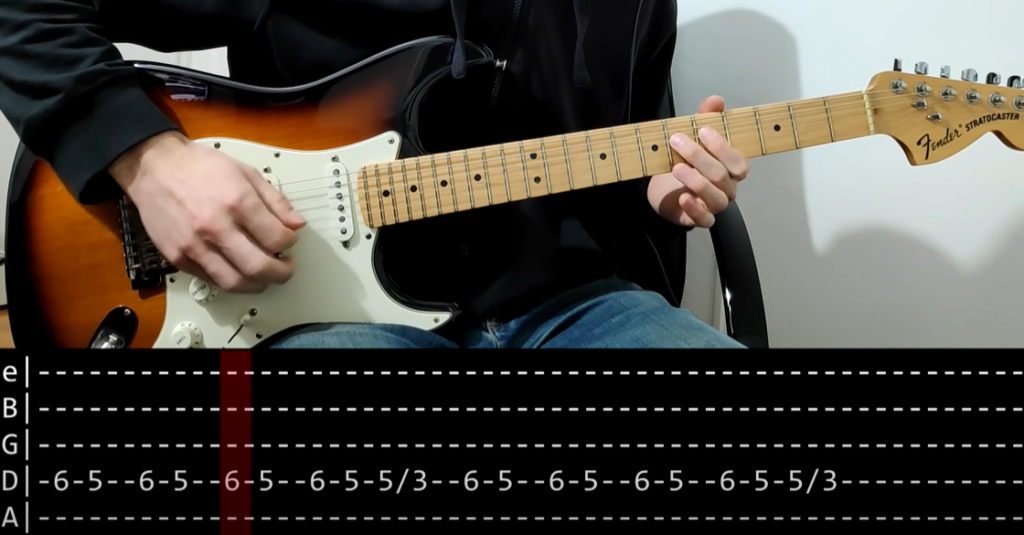
Is it possible to learn guitar by yourself?
Yes, it is indeed possible to learn guitar by yourself. With the right motivation and dedication, you can become proficient on the guitar without any formal instruction. There are countless online resources available such as instructional videos and tutorials that can help guide your practice. Although having a mentor or teacher can be beneficial in some circumstances, it’s not necessary for all levels of playing. The key to success with self-learning is to stay disciplined and consistent with your practice routine – with enough focus and effort, you’ll be surprised at what you can accomplish!
What is the hardest thing to play on guitar?
The hardest thing to play on guitar is highly subjective and depends on the individual’s skill level. For some, it may be playing complex chords while for others it could be intricate lead patterns like soloing or tapping. The best way to find out what the most difficult technique is for you is to take a step back and evaluate your current abilities. From there, you can set goals and create practice routines that help you tackle challenging areas of your playing. With dedication and persistence, even the most complicated techniques can become second nature! No matter how long it takes you to learn guitar, one year is definitely enough time to make significant progress with the instrument.
Why do guitarists tape their fingers?
Taping one’s fingers is a common practice among guitarists to protect their skin from developing calluses and blisters as they play. It is also used to help give more control over the strings and chords when playing, especially with certain techniques like barre chords or slides. Tape can provide more grip on the fingerboard than bare skin, reducing slippage and making it easier to move up and down the fretboard quickly and accurately. While some players don’t use tape at all, others may only apply it for particularly challenging songs or solos. Ultimately, taping your fingers is a personal preference that comes down to comfort level – many players swear by it while others find it unnecessary or inconvenient. Experimenting with different types of tape, such as athletic tape or medical paper tape, can help you find what works for you. Ultimately, taping your fingers is just one tool in the overall practice of becoming a great guitarist – so don’t be afraid to give it a try and decide for yourself!
How do I choose the right guitar for a beginner?
Choosing the right guitar for a beginner involves considering factors like your budget, preferred style (acoustic or electric), and the size of the guitar. It’s essential to visit a music store and try different options to find one that feels comfortable and suits your musical preferences.
What are the benefits of taking guitar lessons from a professional teacher?
Taking lessons from a professional guitar teacher can provide structured guidance, personalized feedback, and faster progress in your learning journey. They can correct your technique, teach music theory, and tailor lessons to your goals.
How can I improve my finger dexterity for playing guitar?
Improving finger dexterity involves regular practice of finger exercises and scales. Start with basic exercises and gradually progress to more complex ones. Consistency is key, so dedicate time each day to practice and build your finger strength and agility.
What are the best online resources for learning guitar?
There are numerous online resources for learning guitar, including video tutorials on YouTube, dedicated guitar learning websites, and interactive apps. Websites like JustinGuitar, GuitarTricks, and Yousician offer comprehensive lessons and exercises for all skill levels.
How can I overcome common challenges in learning guitar, such as barre chords?
Overcoming challenges like barre chords requires patience and focused practice. Break down the technique into smaller steps, work on your finger strength, and practice consistently. Consider using lighter gauge strings and ensuring your guitar is properly set up to make barre chords easier.
What is the role of music theory in learning guitar?
Music theory is important for understanding the structure of music, chord progressions, and scales. Learning basic music theory can help you compose your own music, improvise, and communicate effectively with other musicians, enhancing your overall guitar playing skills.
How can I maintain my motivation to practice and learn guitar?
Maintaining motivation is crucial. Set specific goals, learn songs you enjoy, and play with other musicians to stay inspired. Tracking your progress and celebrating small achievements can also help you stay motivated on your guitar learning journey.
What are some effective practice routines for beginner guitarists?
Effective practice routines should include warm-ups, technique exercises, learning new songs or chords, and playing along with backing tracks. Dedicate time to different aspects of playing, and gradually increase the complexity of your practice as you progress.
How long does it take to become proficient at playing the guitar?
The time it takes to become proficient varies depending on your dedication and practice. While it’s possible to play simple songs in a few months, becoming proficient can take a few years of consistent practice. The journey is ongoing, and there’s always more to learn and improve.
What are some essential accessories for a beginner guitarist?
Essential accessories for a beginner guitarist include a tuner, a comfortable guitar strap, a set of spare strings, a guitar pick, and a gig bag or case for safe storage and transport. These accessories will help you maintain your guitar and enjoy a smoother playing experience.
Useful Video: Learn Guitar WAY Faster Than I Did
Conclusion
Overall, learning guitar can be one of the most rewarding experiences for a musician. It requires patience and practice in order to progress, but with an understanding of music theory, proper technique, and dedication to mastering the instrument, anyone can become a great guitarist. There is no one “best way” to learn guitar; however, by following these steps as outlined above it will make the process easier and more enjoyable. With practice comes musical fluency and personal achievement that cannot be achieved through any other means. Learning guitar can bring hours of enjoyment not only for the player but also for those who experience their music. So get started today! Pick up your axe, find some lessons online or take them from a teacher – whatever route you decide to take, you will be glad you did.
Good luck!
References:
- https://www.fender.com/articles/techniques/best-way-to-learn-guitar
- https://play-guitars.com/best-way-to-learn-guitar/
- https://www.guitaraficionado.com/best-way-to-learn-guitar/
- https://guitardomination.net/14-scientifically-proven-ways-to-learn-and-master-the-guitar-faster-and-quicker-than-ever/
- https://www.ploddings.com/blog/best-way-to-learn-guitar-quickly
- https://nationalguitaracademy.com/guitar-chords-for-beginners/
- https://guitargearfinder.com/faq/how-long-to-practice-guitar/
- https://personal-development.com/articles/top-6-disadvantages-of-playing-guitar.htm





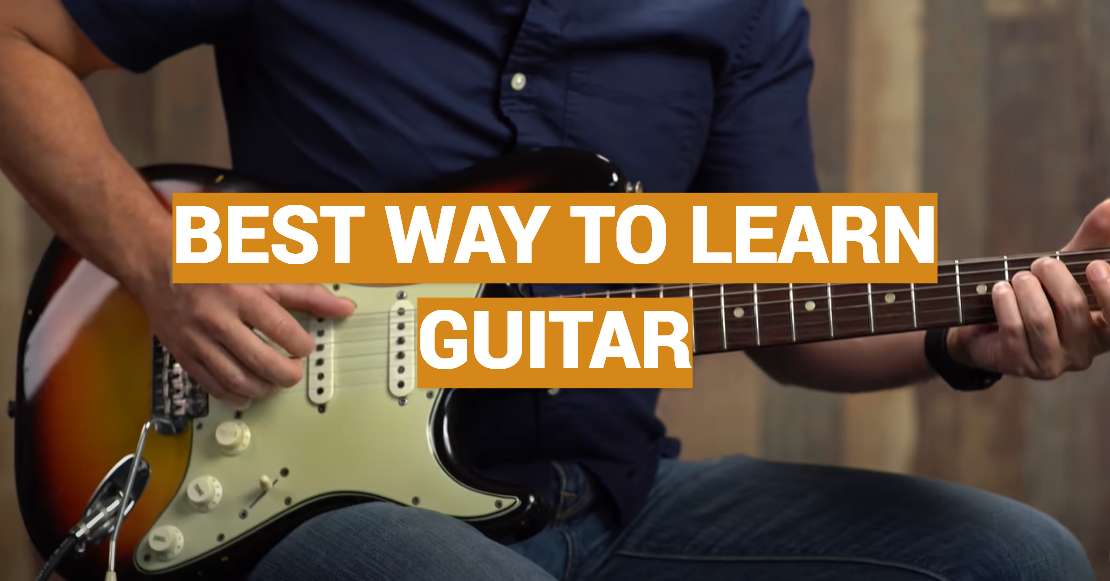




Leave a Reply